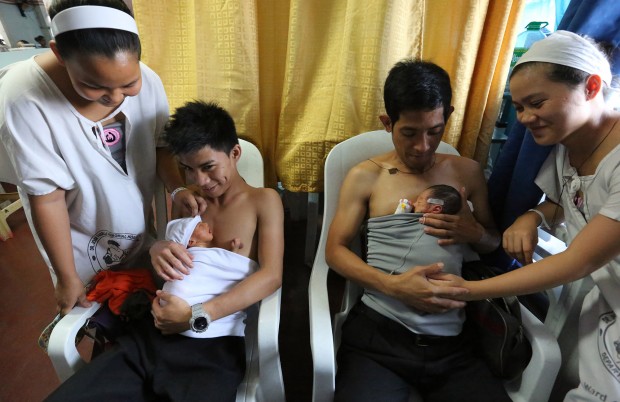‘Baby factory’ WHO model for natal care

FATHERS’ FIRST EMBRACE Mark Anthony Padilla with wife Jessa and Mark Falcon and his wife Jane cuddle their newborn babies at the Jose Fabella Memorial Hospital in Manila during a World Health Organization (WHO) hospital tour for the launching of the “Unang Yakap” (First Embrace) campaign in the Western Pacific. Tender loving care for newborn babies is part of the campaign of the Department of Health and the WHO. JOAN BONDOC
MANILA, Philippines—The country’s “baby factory” is being held up as a model for a World Health Organization (WHO) program emphasizing skin-to-skin contact between mothers and their newborns as a way not only to enhance their bond but also to reduce infant mortality.
The government-run Dr. Jose Fabella Memorial Hospital in Sta. Cruz, Manila, known for its high number of births per day, earned WHO’s praise for effectively pioneering the “Unang Yakap” (First Embrace) program in 2008.
The WHO’s Western Pacific Region Office based in Manila said it would be spreading Fabella’s best practices to other countries in the region with high neonatal, infant mortality and morbidity rates, particularly China, Vietnam, Cambodia, Papua New Guinea, Laos, Mongolia and Solomon Islands.
Along with the Philippines, these seven countries account for 97 percent of newborn and maternal deaths in the region.
The First Embrace initiative will be discussed in a WHO program today to acquaint more health workers, policymakers, civil society advocates and the general public with the program.
“This is something that we learned in the Philippines and now we have exported it…. We are taking it all over the region now,” said Dr. Howard Sobel, WHO regional coordinator for reproductive, maternal, newborn, child and adolescent health, in an interview with reporters on Wednesday.
Unang Yakap mainly involves a four-step protocol for the early care of newborns: The immediate and thorough drying of the baby, early skin-to-skin contact with the mother, properly timed umbilical cord clamping, and nonseparation of the baby from the mother for early breastfeeding.
This is a departure from the traditional practice of cutting the cord immediately after birth, drying the infant and moving it to the nursery while the mother recuperates. At the nursery, the baby is weighed, measured, examined, washed and given the necessary shots. Mother and baby are reunited only when the baby’s condition has become stable or the mother has recovered.
WHO had been bringing foreign health experts and officials to Fabella “so they can see how it is done,’’ Sobel said.
Fabella also introduced the Kangaroo Mother Care (KMC) system, which basically involves the mother wrapping the preterm baby in embrace for warmth and breastfeeding. The practice is considered an effective protection against infection.
Through KMC, the hospital reduced by half the number of newborns requiring admission to the intensive care unit (ICU) over the last four years, WHO noted.
Fabella director Dr. Ruben Flores reported that ICU admissions went down to 4,208 in 2014 from 8,451 in 2010, and that KMC improved the survival rate among newborns with low birth weight as well as among preterm infants diagnosed with sepsis.
Deaths due to sepsis dropped from 34 percent in 1998 (prior to the implementation of KMC) to 24 percent from 1999 to 2004, Flores added.
RELATED STORIES
Pity all the children: Why is PH a ‘baby factory’ in the first place?














